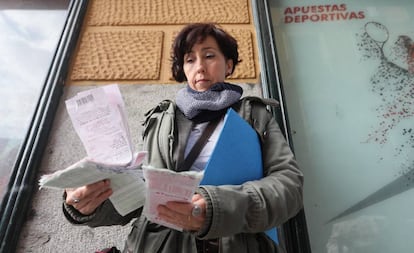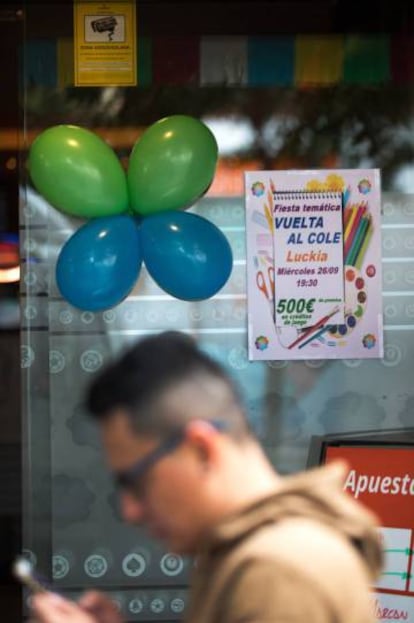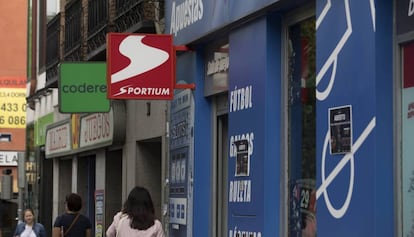Spanish mother’s fight against betting: “My son has been gambling for 10 years. I can’t go on”
Susana Fonseca discovered a decade ago that her child had been stealing money from her to place bets and is now calling for a ban on advertising

Pablo was still in secondary school when he placed a bet for the first time. The 27-year-old from Madrid has been addicted to gambling since 2009. “When he was 18 years old he managed to open the safe we kept in the room. How much time he must have spent to find out the four-digit pin!” says his mother Susana Fonseca. Pablo was cautious. He stole small amounts so as to not arouse suspicion. Sometimes he took out €100, other times €200 or €500. “We realized he was betting when he took €600. To this day, I still don’t know how much he took,” says Fonseca, 51, who began therapy a few months ago to learn how to help her son.

Pablo is not his real name. He wanted to remain anonymous but he also wanted his mother to share his story. And for people to see her petition on Change.org. It’s called “My son is a gambling addict. Regulate advertising now,” and it has received more than 105,000 signatures. “If advertising for cigarettes and alcohol is controlled, why not advertising for betting houses?” it asks. Spain’s minister of consumer affairs, Alberto Garzón, recently said on Spanish television that betting houses are a public health problem. “Advertising is in chaos. It is the law of the jungle,” he said on the television network La Sexta. To make sure he did not forget his words, Fonseca sent the minister a handwritten letter recounting her story: “I have spent 10 years like this. I can’t go on.”
Just two weeks ago, her son went back to gambling. He had nine bets worth €90 stashed in the drawer of his bedroom. “He doesn’t hide them,” says Fonseca. The bets were for a mix of American football games, Spanish and German soccer league matches, and National Basketball Association (NBA) and Spanish basketball games. “My son added his national ID to the website for state gambling addicts so that betting houses wouldn’t let him in, but they still do,” says Fonseca, who works as an administrative assistant. This website has 43,796 registered addicts, double the number from eight years ago. She reported what happened to the Sportium betting house in Torrejón de Ardoz in Madrid region, which is very close to her home. Indeed there are seven gambling houses within a 700-meter perimeter of her house. The first betting house was opened 11 years ago on Castellana Avenue in Madrid. Now there are 385.
Fonseca says it took her a while to accept that her son was a gambling addict. “It shamed me to tell his grandmother and aunt. But it’s been two years since I dropped the charade. I try to do what I can to go on. He supports me, but within a few weeks or days he relapses again.”
“When he was 22, Pablo went to therapy for the first time,” she adds. “I was so happy. But my excitement lasted only nine sessions because he stopped going after four months.” He did not go back. Fonseca blames herself. “Did we wait too long to take him [to therapy]? Perhaps, but before there was not as much awareness as there is now. We knew there was a problem but… I don’t know.”
She breathes and becomes emotional: “I have given him all the resources and tools for him to stop. He is aware that he is a gambling addict but he does not want to go to therapy. And I don’t see myself in a position to force him.”
He went from never sleeping at home on Fridays and Saturdays, to never leaving the houseSusana Fonseca, mother of gambling addict
Fonseca says Pablo has not told her when he placed a bet for the first time or when he stopped seeing his friends. She says Pablo slowly began isolating himself: he stopped going out with his friends and seeing his girlfriend. He shut himself up in his room to play on his computer. “He went from never sleeping at home on Fridays and Saturdays, to never leaving the house,” explains Fonseca. “Young people see betting as normal because they have the support of a home and their basic needs guaranteed: food, clothing, cell phone, internet. It’s not any risk to them. It is just another activity like going to the movies or theater. There are young people who are not affected by it, but my son is.”
The 52-year-old says she has gone through many phases. When Pablo was 20 – the profile of the average bettor in Spain is a man between the ages of 20 and 35 – he stopped working and used an Alcampo supermarket card to buy games, undersell them and use the money to bet. “It took us time to find out,” says Fonseca. Now she tries to manage his money. His salary is deposited into her bank account, but once he refused to do it this way. “And I gave him his entire pay: ‘Here Pablo, €1,300.’” The money lasted 10 days. Another month he spent more than €6,000 – “€3,500 he had saved, €1,300 from work and the rest from compensation he was given because he changed companies.”
Now Fonseca gives Pablo between €10 and €50 a day. He is meant to explain what he wants to spend the money on, but she does not always believe him. “I gave him €150 because he told me he wanted to buy some gloves and some clothes, but that night I saw the bets in the drawer.”

“He doesn’t know why he went back. I no longer know what to say to him,” she says.
Fonseca says that she goes to special therapy for the parents of gambling addicts every two weeks. One day she went to a betting house to try to understand her son’s addiction. Another afternoon, she followed Pablo like a detective to a betting parlor. He saw her as he was leaving and hid his face. She sent letters to the Real Madrid soccer club and other places that advertise betting shops. No one answered her. She turns off the television and the radio every time she hears a gambling ad.
Last week, after registering herself as a gambling addict to conduct a test, she went to the Codere betting parlor in Lavapiés square. No one stopped her. Nor did they stop her in two other gambling houses in Torrejón de Ardoz. “Does the government know this is happening? Is there no control?” she asks. “They don’t ask for ID, they are letting addicts continue to gamble.”
Fonseca spends almost her entire day thinking about whether her son is gambling. “I would put a bomb in every betting shop!” she says. “I feel myself getting worse because the situation is the same as it was 10 years ago. I would like him to be happy, to be laughing, to be going out to parties, to have a girlfriend, because he is very good-looking.”
A few weeks ago, Pablo agreed to move out in May and go live in an apartment that his mother owns in Alcalá de Henares. “He will be flying solo. That will be the last month that I manage his money. I don’t know what will happen after that.” She says some nights, Pablo approaches her and says: “Mom, I haven’t bet for days.” It gives her great happiness “but it doesn’t last long.”
English version by Melissa Kitson.
Tu suscripción se está usando en otro dispositivo
¿Quieres añadir otro usuario a tu suscripción?
Si continúas leyendo en este dispositivo, no se podrá leer en el otro.
FlechaTu suscripción se está usando en otro dispositivo y solo puedes acceder a EL PAÍS desde un dispositivo a la vez.
Si quieres compartir tu cuenta, cambia tu suscripción a la modalidad Premium, así podrás añadir otro usuario. Cada uno accederá con su propia cuenta de email, lo que os permitirá personalizar vuestra experiencia en EL PAÍS.
¿Tienes una suscripción de empresa? Accede aquí para contratar más cuentas.
En el caso de no saber quién está usando tu cuenta, te recomendamos cambiar tu contraseña aquí.
Si decides continuar compartiendo tu cuenta, este mensaje se mostrará en tu dispositivo y en el de la otra persona que está usando tu cuenta de forma indefinida, afectando a tu experiencia de lectura. Puedes consultar aquí los términos y condiciones de la suscripción digital.









































